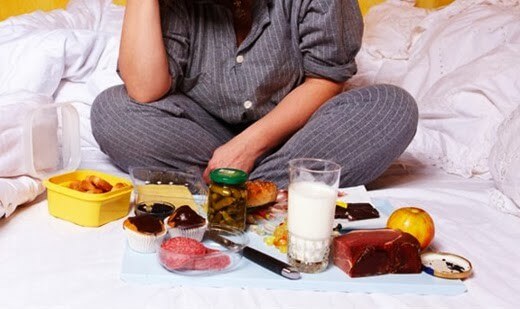Binge Eating Disorder is the most common eating disorder in the U.S. We don’t hear as much about it as we hear about anorexia and bulimia, but it too is a very serious, life-threatening condition. Binge eating disorder is when someone rapidly eats way too much food at once but doesn’t ‘purge’ afterward the way that bulimics do. Two out of every three individuals with binge eating disorder develop obesity, another disease with its own long list of risks and ill effects. It is best to seek binge eating disorder treatment as early as possible to prevent further illness. However, even after developing obesity or other related conditions, it is still possible to break free from binge eating disorder and lose weight.
Psychologists diagnose this disorder using a checklist of the following symptoms (sourced from the National Eating Disorder Association).
Recurrent episodes of binge eating. An episode of binge eating is characterized by both of the following
- Eating, in a discrete period of time (e.g., within any 2-hour period), an amount of food that is definitely larger than what most people would eat in a similar period of time under similar circumstances.
- A sense of lack of control over eating during the episode (e.g., a feeling that one cannot stop eating or control what or how much one is eating).
The binge eating episodes are associated with three (or more) of the following:
- Eating much more rapidly than normal.
- Eating until feeling uncomfortably full.
- Eating large amounts of food when not feeling physically hungry.
- Eating alone because of feeling embarrassed by how much one is eating.
- Feeling disgusted with oneself, depressed, or very guilty afterward.
- Marked distress regarding binge eating is present.
- The binge eating occurs, on average, at least once a week for 3 months.
The binge eating is not associated with the recurrent use of inappropriate compensatory behaviors (e.g., purging) as in bulimia nervosa. The binge eating does not occur exclusively during the course of bulimia nervosa or anorexia nervosa.
Do you identify with anything on this checklist? If you believe you are affected by Binge Eating Disorder, don’t stay silent. Effective treatment is available, as long as you reach out.
What does treatment consist of?
Binge eating disorder treatment is multifaceted and involves a mix of different approaches, depending on the patient’s unique needs. Binge eating disorder is thought of as an expressive disorder which means that the disorder usually isn’t a standalone illness. Most of the time, binge eating is an expression of deeper psychological wounds, such as depression or anxiety. This means that treatment is not just about stopping the binges, it’s about treating the person’s wounds in all areas of mind, body, and spirit. This makes binge eating disorder treatment more complicated than just taking a pill or seeing a therapist once a week. Treatment usually consists of a mix of all the following:
Nutritional Counseling
Drug treatment: Vyvanse, Anticonvulsants, and Anti-depressants have been shown to help reduce the frequency of binges.
Psychotherapy
Cognitive Behavioral Therapy
Family therapy
Treatment involving weight loss
Some practitioners recommend that Binge Eating disorder is classified as a form of addiction. This is because the behaviors associated with the disorder are so similar to drug and alcohol addiction. Those with Binge Eating Disorder report similar experiences that addicts do, like strong irresistible cravings and the inability to cut down on the addictive substance, whether it’s food or a drug. In other words, Binge Eating Disorder can be thought of as a food addiction. Instead of using drugs or alcohol, those with this disorder use food to cope with their inner pain in a problematic and extreme way. Food provides a similar ‘high’, or instant reward, providing relief from bad feelings in the way that drugs or alcohol do.
Perhaps you can relate to this pattern of behaving. Have you ever used junk food to feel better? Eaten ice cream in response to sadness? It’s normal to do this occasionally, just like it’s normal to drink alcohol on occasion. However, these coping strategies can spiral out of control into addiction or binge eating disorder, especially during times of stress.
Get Help Today for Binge Eating Disorder
The similarities between addiction and Binge Eating Disorder indicate that there might be a common cause between these two conditions. This is why we strongly recommend an inpatient stay at a rehabilitation facility, as we do for drug addiction, specializing in your unique condition. It may come as a surprise, but at an inpatient facility, you will be able to join with dozens of others facing the same problem with binge eating that you are facing now. You’ll be able to see that you are far from alone! Also, you will be able to leave behind the stresses of your life for a short period of time while you learn a brand new relationship with food that sustains you, instead of hurting you. Please contact us for more answers; you can start a new life without the shame of binge eating bringing you down.













